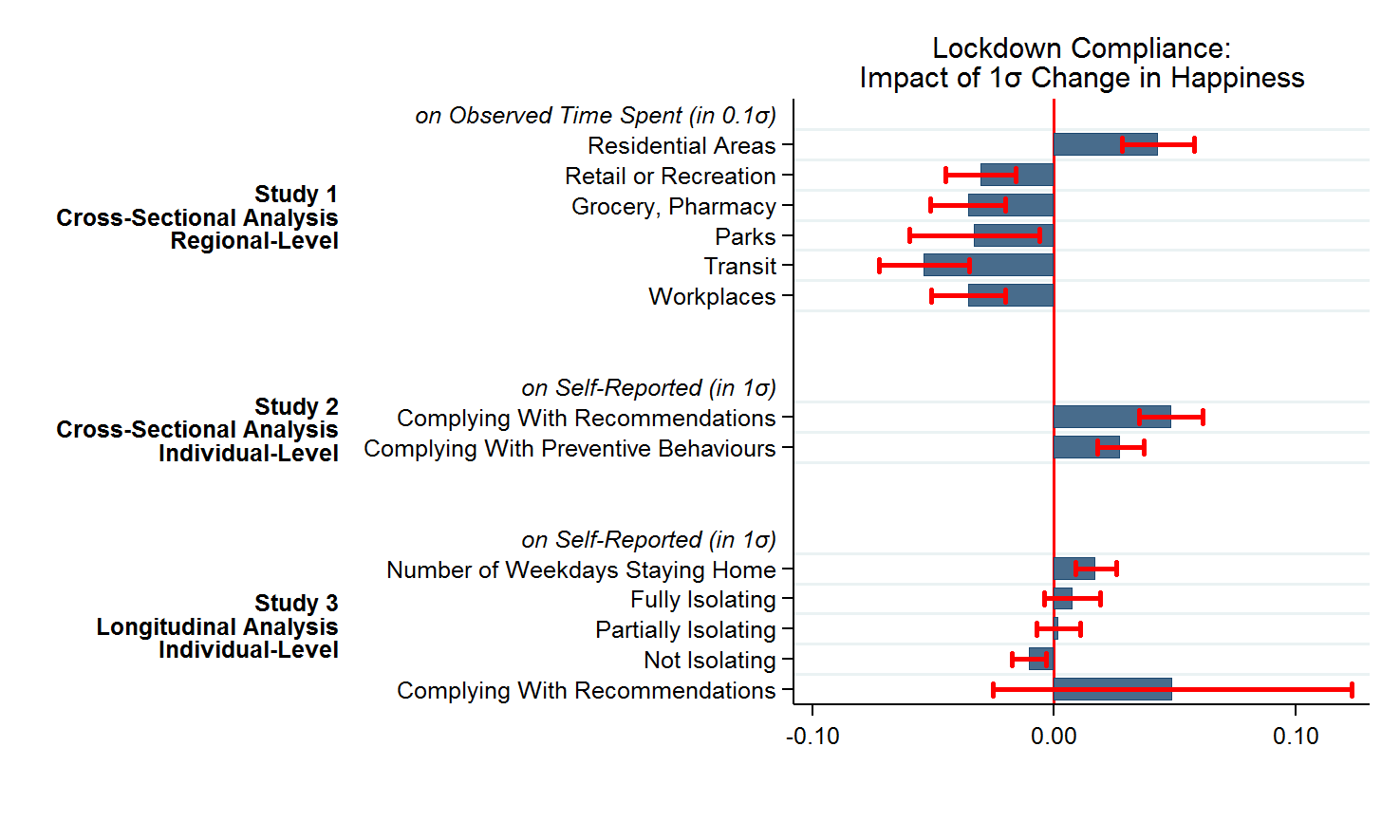Are happier people more compliant during Covid-19 lockdowns?
To tackle the Covid-19 pandemic, governments around the world have introduced lockdowns, asking citizens to adhere to unprecedented measures restricting their personal freedoms. The legal enforcement of wide-ranging lockdowns through policing is almost impossible, so governments must rely on compliance – particularly in the case of multiple lockdowns – like we are currently experiencing in the UK.
This means that studying what makes people more likely to comply with restrictions is key to designing effective policy communication and measures to contain the pandemic.
Two existing models of happiness and compliance
The affect infusion model predicts that happier people show less compliance. It assumes that they perceive risky prospects, such as falling ill from Covid-19,as less dangerous or that they act more selfishly: for example, by behaving less carefully in front of others who may be at greater risk.
In contrast, the mood maintenance model assumes that happier people show more compliance if compliance is not too much of a burden. This is simply because they have more to lose. They should strive to retain their current levels of happiness.
Key findings
We tested these competing psychological theories in nearly perfect quasi-experimental conditions, exploiting the worldwide introductions of Covid-19 lockdowns in the first half of 2020 as large-scale experiments.
Across the board, we found a positive relationship between happiness and compliance:
- People that lived in areas with higher levels of happiness in 2019, spent more time in residential areas and less in restricted areas such as retail or recreation, transit, or workplaces.
How we found this: we used nationally representative cross-section data on about 50,000 respondents from 892 regions in 49 countries from the Gallup World Poll. We measured objectively in terms of time spent in different geographical areas obtained from Google Mobility Reports. - During the pandemic, people that said they were happier were more likely to report that they were complying with government recommendations and preventive public health behaviours, including washing hands, covering mouth and nose, or avoiding contact.
How we found this: we used self-reports from more than 39,000 respondents from 330 regions in 20 countries from the Imperial College London-YouGov Covid-19 Behavioural Tracker. - People who reported higher levels of happiness were more likely to spend more weekdays at home and to isolate when told.
How we found this: We exploited a novel panel of more than 30,000 individuals – the University College London Covid-19 Social Survey in the UK, using (dynamic) individual fixed effects panel data models while controlling for a wide range of time-varying observable characteristics of survey respondents.
The graph below summarises the findings from our three studies. It shows how one standard deviation increase in happiness, based on the spread of the data, relates to compliance. Here, a standard deviation increase is where happiness is higher than the average level of happiness by a fixed amount.
Compliance behaviour is also measured in terms of a one standard deviation change, except for ‘observed time spent in different geographical areas’, which is measured in terms of a tenth of one standard deviation (for scalability reasons).
The graph below shows that in study two, for example, people with happiness that is one standard deviation higher than the average, were about 0.05 of a standard deviation more likely to comply with recommendations.

Notes: Shown coefficients for Study 3 come from dynamic panel data Arellano-Bond estimator. All coefficients covariate-adjusted. All variables standardised with mean zero and standard deviation one. Confidence bands 95%.
Importantly, these findings held for different dimensions of subjective wellbeing, including life satisfaction and evaluation, affect, and how worthwhile people felt their life was (purpose)- known as eudemonia.
Negative affect, as measured by how anxious people are, was associated with less compliance. This may help explain reactance bias, rebelliousness, and protests against lockdown measures observed in many countries around the world.
The relationship between happiness and compliance was stronger amongst older people and people who are at greater health risk of Covid-19, suggesting that risk-avoidance may be a primary motivation behind compliance behaviour.
What are the policy implications?
Our findings are in line with the predictions of the mood maintenance model and that people behave risk-aversely by trying not to jeopardise their current happiness levels. They also matter at both a practical and a policy level:
- They stress that we need to be aware of the impact that our current mood has on our behaviour.
- Policy-makers could devise interventions aimed at raising wellbeing during lockdowns, specifically targeting population groups at risk of low wellbeing, and target policy communication more effectively.
More generally, our findings suggest that a stronger focus on wellbeing in policy-making – while being a good in itself – could also help increase compliance with some of the toughest measures of our time.
References
Tan, H. B., & Forgas, J. P. (2010). When happiness makes us selfish, but sadness makes us fair: Affective influences on interpersonal strategies in the dictator game. Journal of Experimental Social Psychology, 46(3), 571-576.
Krekel, C., Swanke, S. A., De Neve, J.-E., & Fancourt, D. (2020). Are happier people more compliant? Global evidence from three large-scale surveys during Covid-19 lockdowns. CEP Occasional Paper, 54.
